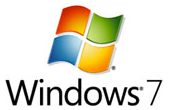 With the release of Windows 7, comes a new list of hardware requirements to run the latest operating system from Microsoft.
With the release of Windows 7, comes a new list of hardware requirements to run the latest operating system from Microsoft.
If you decided to make the move, after comparing the different versions of Windows 7 (link to above article) the next item you need to consider is if you can run Windows 7 on your existing hardware or do you need to purchase new hardware.
The Windows 7 requirements specifications released by Microsoft follows:
- 1 GHz or faster 32-bit (x86) or 64-bit (x64) processor
- 1 GB of RAM (32-bit)/2 GB of RAM (64-bit)
- 16 GB of available disk space (32-bit)/20 GB (64-bit)
- DirectX 9 graphics device with Windows Display Driver Model 1.0 or higher driver
Obviously, by today's hardware standards, these requirements are on the minimal side. And as we all know, you may want to bump these requirements up.
For example, if you plan to run XP Mode, you will need at least 2 GB RAM along with an extra 15 GB of additional hard drive space. Also consider a processor that supports hardware virtualization.
Same considerations should be made if you want to use Virtual PC running several virtual machines. Depending on the number of virtual machines you want to run will determine how much RAM as well as how much processing power is needed. You may want to move to 64bit hardware to allow for more processing power and larger RAM amounts.
32-bit versions of Windows 7 are limited to supporting just 4 GB of RAM (in reality, only 3.1 to 3.5 GB are actually usable), 64-bit versions can access between 16 GB and 192 GB of RAM, depending on the product edition.
Gamers and multimedia power users may also want to consider moving to 64bit hardware to run Windows 7.
If you are an average home Windows users, 32bit will be just fine.
Will My Existing Hardware Run Windows 7?
According to early tests, Windows 7 performs better than Windows Vista on the same hardware, but if you are not sure, Microsoft provides a tool called The Windows 7 Upgrade Advisor.
The Windows 7 Upgrade Advisor will scan your system hardware, installed programs and attached devices. Once complete, the Advisor will report on how well your PC meets the system requirements, if there are any known compatibility issues with your programs and devices, and will also provide guidance on your upgrade options to Windows 7.
Unlike Vista, Windows 7 early tests have shown it to be more stable with performance than Vista. That's something us XP users are happy to hear!



Comments on What Are The Windows 7 Hardware Requirements?
Diana @ 7:57 am
Yeah!